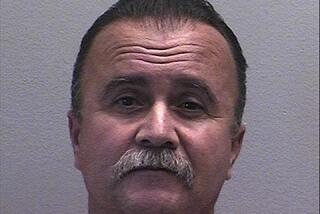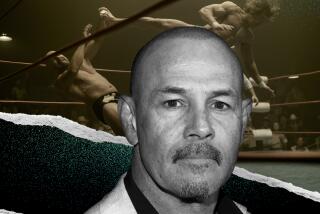PROFILE : A New Vocation : A career in pro wrestling behind him, Bill Olivas is preparing to become a priest.
- Share via
Now that he’s finished wrestling with 250-pound men, Ojai’s Bill Olivas is preparing to grapple with some heavyweight theological issues.
Late last month the 69-year-old former wrestler, known to his fans as the Wild Man of Borneo, or Elephant Boy, was accepted as a novice by the Order of St. Augustine. A deacon at St. Thomas Aquinas Church in Ojai for 13 years, Olivas is preparing to be ordained as a priest there next August.
As he sat behind his desk in the church rectory, a Bible to his left, to his right a photo of himself crushing a sweaty opponent in a headlock, Olivas recalled the improbable route he took to get where he is today.
“I’ll probably be the only former wrestler to become a priest,” he said. At 5 feet, 10 1/2 inches tall and 240 pounds, with a friendly demeanor and a teddy bear face, Olivas can convincingly pass as a member of either vocation.
“That’s why I figure if the Good Lord has a plan for you it’s going to happen.”
A native of Ojai, Olivas comes from a long line of Ventura County Olivases. Olivas Park was named after his great-great-grandfather Raymundo, a soldier in the Mexican army.
Olivas attended Villanova Preparatory School, an affiliate of St. Thomas Aquinas Church, and upon graduation enrolled at Los Angeles College, a Catholic school that has since closed. Throughout his school years Olivas had dual interests: religion and combat sports.
While Olivas was attending college, World War II broke out and he enlisted in the Army. He served as an assistant chaplain and as a combat engineer, and participated in the invasion of Normandy.
While stationed in England, Olivas was introduced to wrestling. “We had nine months of training before the invasion and that’s when I became interested in body building,” he said. “That’s when I became acquainted with pro wrestlers.”
One of those wrestlers was fellow soldier Bobby Coleman, who had discovered that money could be made by flinging people around in the nearby town of Southampton. Olivas began working out with Coleman and accompanying him to his Friday night fights at a local club.
“One night Coleman’s opponent didn’t show up so he came over to draft me to fight with him so he wouldn’t lose out on the money,” Olivas said. “He was making 70 pounds, $210 in our money, and that was a lot for a private. It was about a 10-minute match. It went pretty well.”
It went well enough that Olivas was booked to fight every Friday night, thus beginning a journey that would take him all the way to Gorgeous George, and on to God.
After the war ended, Olivas returned to Ojai intending to go back to school, “but at that time it seemed very dull,” he said. “I was very nervous trying to sit still in Ojai. Wrestling was a kind of way to get rid of the tension. It was the challenge of combat.”
So he contacted Coleman, who was then wrestling in Chicago, and asked for help in establishing a full-fledged wrestling career.
It was the mid-1940s, the heyday of wrestling, and Olivas soon found himself battling it out with the best in the profession, in big-time venues like Madison Square Garden and, eventually, on television. To enhance his entertainment value, Olivas was given ring aliases and he frizzed his hair.
While wrestling in Arizona, Olivas met his wife, Marcia, a nurse and dietitian who died in 1988. After their marriage in 1961, the couple went to Europe, where wrestling was especially popular. Olivas made a nice salary--$5,000 per month, plus 10% of all gate receipts. He was hardly a fan favorite.
“The fans were very hostile toward me. In European countries they naturally supported their home guy,” he said. “The greatest damage came from the fans. They’d throw everything from drinks to tomatoes.”
The action inside the ring got pretty hairy too.
“I had some broken bones, cracked ribs. Once in London I got four cracked ribs from a body slam,” he said. “One time I was wrestling Lou Thesz, the United States champion. I drop-kicked him and he lost most of his teeth.”
When he wasn’t wrestling, Olivas was going from spa to spa with his wife, studying the therapeutic uses of the facilities. Soon after the couple ended their three-year stay in Europe and returned to Ojai, they took over management of the historic Matilija Hot Springs.
“When we came back, the place was running into some problems and the county wanted to lease it out to a private individual,” he said, “so we leased it from the Board of Supervisors.”
In 1947, the county had taken over the sulfur hot springs, which had been privately held, for flood control purposes and as a recreational facility. Matilija Dam, as it turned out, never did overflow as had been anticipated, so in 1964 the county decided to lease the springs to private operators.
The Olivases ran Matilija Hot Springs until the county reclaimed it in 1987 and put it up for auction. Business had been slow, a forest fire had damaged their property in 1985, and county administrators wanted to put public money into other park properties.
From the days of the Chumash Indians until 1947, the sulfur springs had been thought to have therapeutic properties. Olivas and his wife reopened the spa to people who had arthritis and general aches and pains, with particular interest in the elderly.
Through his work Olivas became involved with St. Thomas Aquinas Church. In 1977, he was ordained as a permanent deacon, continuing his work with sick and elderly people and taking over the job of business manager for the church.
Shortly before the county took back the hot springs, Marcia Olivas had a heart attack from which she never recovered. After her death in 1988, Olivas turned his attentions entirely to the church.
“It filled a great void,” he said. “I was going through a grieving process. We were very close to each other. We had been married 27 years.”
For the past year Olivas has had a trial run at life as an Augustinian priest. He has lived on church grounds with the three priests there, sharing everything from meals to prayer. After his novitiate year is over Olivas will take the vows of poverty, chastity and obedience.
Olivas concedes that it will be a dramatic change in lifestyle, but said he does not expect any difficulty adjusting to life totally revolving around the church. “Wrestling was very good to me. It gave us everything, happiness and all that, but I don’t have too much to give up. I’m sure the calling was there all the time.”
UP CLOSE: BILL OLIVAS
Vocation: Deacon (Formerly a wrestler, soon to be a priest.)
Most weight lifted: Bench-pressed 375 pounds at age 20. “It was almost double my weight at the time. I was a pretty good weightlifter in my day. Of course, the body doesn’t look it now. The chest has dropped.”
Favorite sermon topic: “On Whose Side Are We On?” (God’s or the world’s.)
Favorite wrestling fans: Those in Papeete, Tahiti. “They thought I was a god there.”
Record against wrestling great Gorgeous George: Three wins, five losses. “The girls whistled at him, the guys got mad. I was a popular guy when I fought against him--the fans wanted me to beat him.”
More to Read
Go beyond the scoreboard
Get the latest on L.A.'s teams in the daily Sports Report newsletter.
You may occasionally receive promotional content from the Los Angeles Times.










